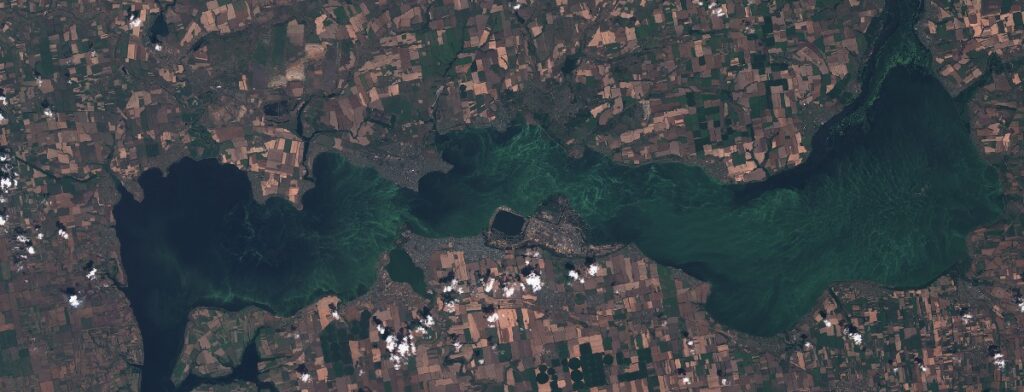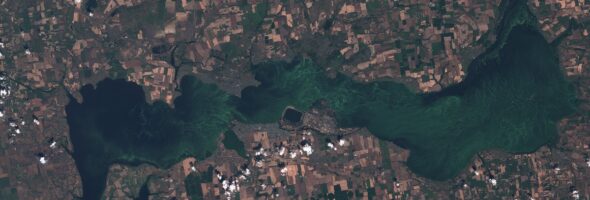
Tragic wide-spread consequences of the Kakhovka Dam destruction call for innovative revival initiatives to meet needs of people and support restoration of nature. In a short interview on the Euronews, broadcasted in seven languages, Eugene Simonov said: “I as an ecologist, would not support and would not advise to go for recreation of the Kakhovka reservoir”. This echoes an earlier statement by civil society groups from Ukraine and 18 other countries other countries that called to pursue river restoration and more sustainable economic solutions in the course of Ukraine’s recovery. The Rivers without Boundaries International Coalition sees this case as an important test for Ukraine and donors supporting restoration efforts after the war.
More than a month has passed since the explosion at the Kakhovka Dam in southern Ukraine. Water levels have since declined and fighting has intensified along the Dnieper River, which marks the line between Kyiv and Moscow’s battling armies.
When the dam collapsed, dozens of people died and thousands more were faced with homelessness and lack of drinking water. And much of the area’s environment and agriculture have been heavily damaged.
“The whole ecosystem – basically the whole ecosystem – of the reservoir is ruined and there is a certain precondition for the revival of the ecosystem of the more free-flowing river,” Eugene Simonov told Euronews.
“However, it’s associated with a catastrophic change for all local species, with a new species that will be reestablished there which are more adapted to the river, not to the reservoir. And it’s a complete catastrophe for people who are used to different environments.”
Crimea could dry up without irrigation while agriculture in Ukraine’s Kherson and Zaporizhzhia regions has been heavily damaged.
But despite this, some environmentalists like Simonov are arguing against restoring the reservoir.
Simonov said: “The idea that someone will come in and rebuild this inefficient reservoir looks very strange to me as an environmentalist in the 21st century.”
He added that the dam had previously provided residents with “very low-quality water with a lot of pollution” and caused more water to evaporate than was supplied for agriculture.
The reservoir also took up more than 2,000 square kilometers of land, and Simonov argues that this area could have been “used for many other environmental and economic purposes, much more productively.”
“I as an ecologist, would not support and would not advise to go for recreation of the reservoir. But would support very intensive research and actions to help people to adapt to a new reality and to help to supply needs by other more modern means, which are more ecologically friendly and more sustainable in the long run.”
The regions most affected by the Kakhovka Dam breach have also been heavily impacted by fighting, making new research and initiatives even more difficult.
Nevertheless, Simonov argued that it was the right choice.
“The whole idea of revival after the war. You should things think how to do things better,” he said. You should not think how to get yourself into a prewar situation. You see? Because it could be the worst thing you can achieve. It’s actually not unique not endemic to that area. It’s a general idea on how you think about recovery. You want to have modernization and more ecologically-sustainable life after recovery. Otherwise, you are in trouble.”
The Euronews recognized importance of this point of view for on-going policy making efforts and published this short TV episode in all major languages of its broadcasting: English , French, Russian , German, Italian, Spanish, Portuguese .
This general message seems to reflect a consensus among many environmental NGOs. On June 20 2023 addressing the Ukraine Recovery Conference (URC 2023) representatives of many NGOs came up with a statement that said : “ Rebuilding the dam and its 2,000 km2 reservoir would not represent the best path forward given its extraordinary expense, high environmental impacts, climate vulnerability, remaining threat of destruction, and availability of more sustainable solutions.”. This statement was issued by the Ukraine Nature Conservation Group, International Rivers, Ecoaction, CEE Bankwatch Network and 15 other groups. Environmentalists hoped that this review of development alternatives presented by the Kakhovka Dam blast may force decision-makers in London to start thinking “out of the box” and come up with sustainable solutions.


